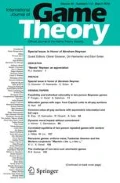Abstract.
In this paper we consider the effect of the `impatience ratio' I (of the worker discount factor to the firm discount factor) on the preferences of the players between two bargaining schemes in an asymmetric information wage bargaining context. The firm has private information about the worker's value and the worker makes wage demands. In the contact bargaining scheme, a wage demand which is accepted in one period is binding for all future periods (and hence the bargaining ends after acceptance of a wage demand). In the repeated bargaining scheme, the parties continue to bargain irrespective of whether the worker has been hired or not, and any accepted wage demand is only valid for the period in which it was accepted. We establish the following results under the assumption that the worker's value is uniformly distributed on an interval: When the firm is more patient than the worker (I<1) both parties prefer contract bargaining, and when the worker is more patient than the firm (I >1) both prefer repeated bargaining. For any value of I, the preferred type of bargaining gives the lower unemployment.
The work of Bae has already shown that when players are equally patient (I=1) the players are indifferent between the two schemes, regardless of the distribution of the worker's value. This paper shows that Bae's indifference result (Bae, 1991) cannot be extended to unequally patient players.
Similar content being viewed by others
Author information
Authors and Affiliations
Additional information
Received: December 1996/Final version: October 1998
Rights and permissions
About this article
Cite this article
Reyniers, D. Relative impatience determines preference between contract bargaining and repeated bargaining. Game Theory 29, 165–176 (2000). https://doi.org/10.1007/s001820000032
Issue Date:
DOI: https://doi.org/10.1007/s001820000032



